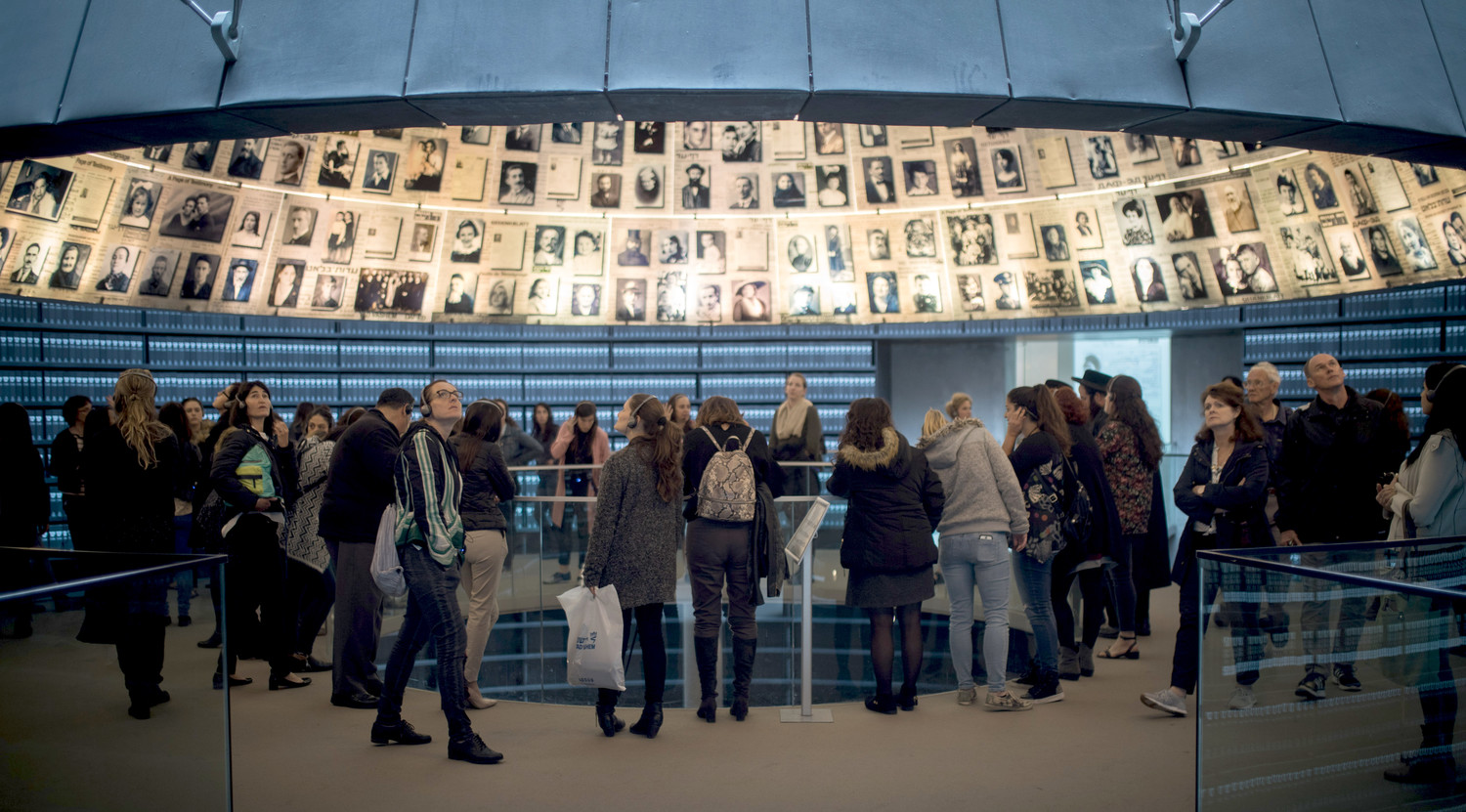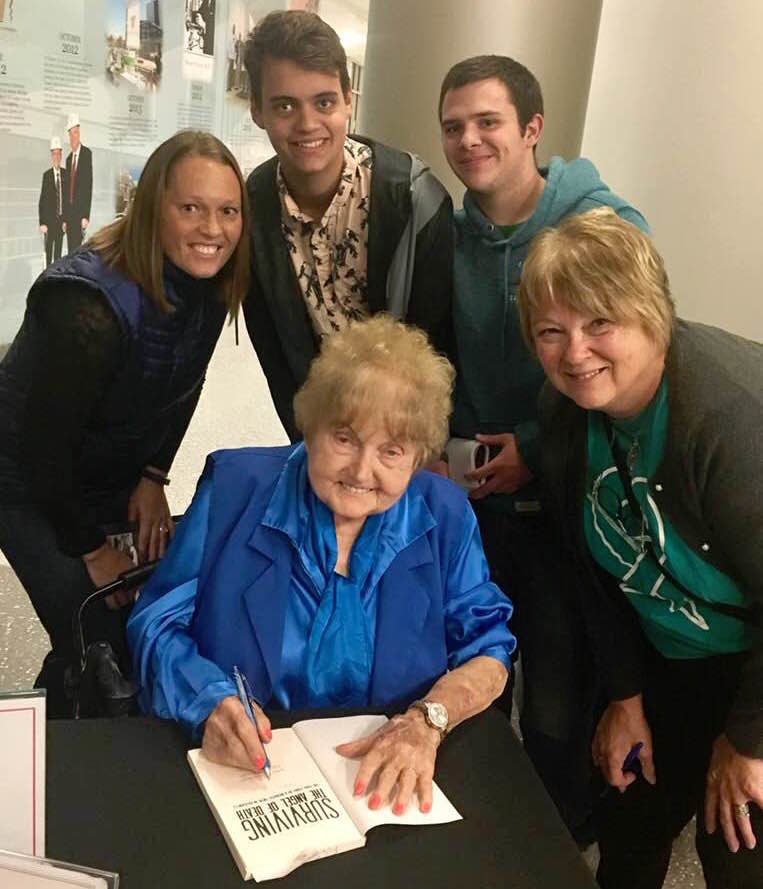Yad Vashem tackles new anti-Semitism
American teachers like Lori Fulton are poised to hold back a tidal wave of anti-Semitism. Their tools come from a hillside in Jerusalem, thousands of miles from her classroom in Mattawan, Mich.
Fulton, a high school English teacher, spent two weeks last summer at Yad Vashem, where she learned how to bring these terror-filled years alive for her students.
“I thought I knew about the Holocaust, but I realized I was missing something,” she says. “Sure, we can read Wiesel’s Night and watch ‘The Pianist,’ but only when you have the human stories — what it was really like to live through that hell — does everything change.”
Yad Vashem’s International School for Holocaust Studies hosts 7,000 teachers annually, and its programs train thousands more in 50 countries. It provides online teacher resources, including survivor testimonies, photos, film footage and lesson plans in 20 languages for classrooms around the globe, in addition to resources for adults.
These offerings could not be more timely, given the uptick in anti-Semitism in Europe and around the world. The Holocaust’s lesson: The unimaginable horror born when “garden-variety” anti-Semitism is permitted to fester and turn murderous while the world’s global powers turn a deaf ear.
And that puts Fulton and thousands of other teachers on the front line, armed with weapons supplied by Yad Vashem.
‘Something they will take with them’
The 1 million visitors each year who visit the powerful structure — that seems to close in on the viewer, conveying the feeling of being hunted down — may not realize that the adjacent school is a beehive of activity.
In the last two decades, 50,000 teachers from 12,000 schools have returned home inspired, impacting more than 5 million students over the years.
“Our job is to tell the historical truth based on documentation,” says Avner Shalev, Yad Vashem’s chairman. “And the most important thing we do here is train teachers.”
“My students have no clue what Yad Vashem is, but after hearing survivor testimony and reading about their lives and the world they lived in, each one is going to own someone’s story,” says Fulton. “There’s nothing like looking over my football player with tears in his eyes watching Schindler’s List.”
Braxton French says learning about the Holocaust in Fulton’s class changed the way he sees the world. “We read books and watched videos, and we visited a survivor. I don’t know what it’s like to be in her situation, but it’s crazy to think about how this could have happened,” he says. “I’m a Christian, but when my friends say history isn’t important, I say, ‘Yes, it is’ or ‘It could happen again.’”
One of the tools Fulton and her fellows use is Echoes and Reflections, a curriculum Yad Vashem created with the Anti-Defamation League and the USC Shoah Foundation.
“We’re helping teachers convey the important truth that the Holocaust is both an historical event and the result of human factors — something that can happen anywhere and anytime,” says project director Sheryl Ochayon. The course introduces concepts like stereotypes, propaganda, dehumanization, hate crimes and anti-Semitism, along with real-life stories.
“We also invite them to look carefully at the role of the bystander in anti-Semitism and other forms of hate, and in the unit on contemporary anti-Semitism, at their own culture for signs of these things. Stereotypes like ‘Jew you down,’ when they see what it really means, they won’t be as likely to perpetuate it. Something they will take with them when they get to campus or out in the world.”
“When my students go online to research Holocaust topics, they find lots of sites saying it never happened,” Fulton says. When they return to class confused, she tells them, “Yes, there are Holocaust-deniers, and there are people who think the world is flat … And when they ask why the Poles didn’t realize what was going on, I say, ‘Of course they knew: The stink of burning bodies 24-7, the ashes, the trains full of people.”
That, she says, leads to a discussion of the innocent bystander.
In addition to teens, Yad Vashem raises the consciousness of adults, too.
“It’s not enough to have students learning the lesson of the Holocaust in school,” says Shulamit Imber of Yad Vashem’s International School for Holocaust Studies. “Anti-Semitism can be fundamental to a culture.
“The Holocaust demonstrates clearly what anti-Semitism taken to the extreme becomes. And I do believe that when people see the connection words have on actions and what those actions can lead to, it can inspire a greater awareness of the potential danger of hate both personally and communally.”
Yad Vashem offers a free online course, Anti-Semitism From Its Origins to the Present, exploring how and why anti-Semitism rears its head in every generation. The course features 50 of the world’s top experts’ insights into anti-Semitism from ancient times to today.
‘The last generation who will see survivors alive’
“My students are very much aware that they are the last generation who will see survivors alive,” says Fulton.
That’s why they write books and spend hours reliving their experiences on videos, adds French. “And they leave their memories to ensure it won’t happen again. I want my children to know this so they can pass it on, too.”
“Once there is no one left to tell, it’s going to be harder to convince people,” says Joseph David Farkas, 84, who remembers German soldiers knocking on the door of his family home on the Romanian-Hungarian border. “My father offered them a drink, and they told him that the SS was coming the next day, and we would all be killed.” Within hours, the family fled. “I was 10, and I remember it all,” says Farkas. “But when we are not here to tell about it, how will anyone understand?”
It’s something that drives much of what is done at Yad Vashem, says senior historian Dr. Robert Rozett. But, he cautions, Holocaust history alone cannot protect the world from the dangers of anti-Semitism. “Anti-Semitism hasn’t really gone away, and though awareness of the Holocaust demonstrates where anti-Semitism and racism can lead, it doesn’t inoculate people by itself. It’s part of a toolbox.”
The other piece of the formula is planting in each heart “the value of how we respect people different from ourselves and make room for them in our world,” says Rozett.
But when a school district has three hours a year to teach the Holocaust, he asks, how can educators possibly give students a true sense of what happened, and why it’s so important to avoid hate speech?
“Parents and teachers need to say again and again: ‘Racism, anti-Semitism and hating those who are different, these are not our values. We can be better than that. We must be better than that.”
Fulton understands that well. “I believe education is the only way to stem anti-Semitism in the world today,” she says. “It’s unfortunately quite easy for those who do not understand a different culture or religion to feel prejudice. But when students show real emotion because of the stories of real humans who lived and died at the hands of the Nazis, they have an epiphany about others unlike themselves.”

 50.0°,
Partly Cloudy
50.0°,
Partly Cloudy 







